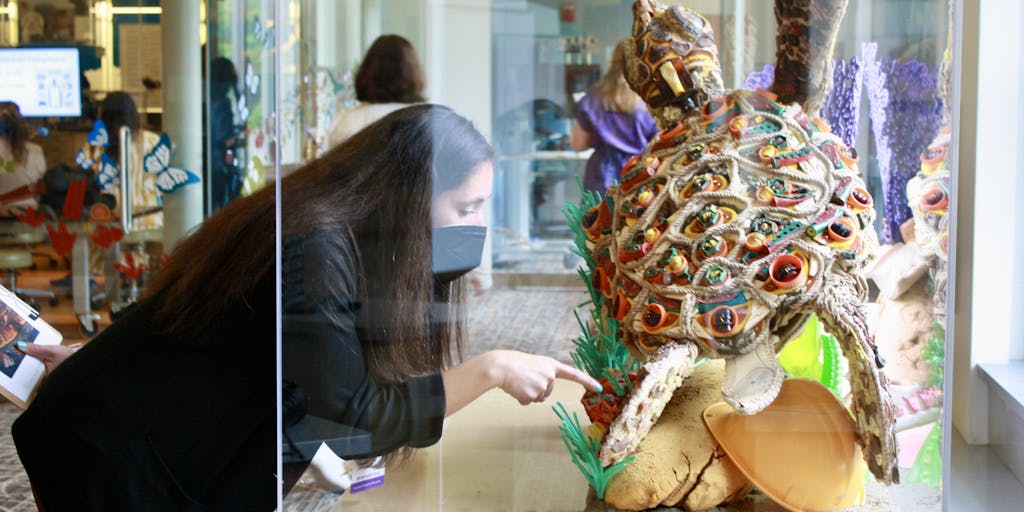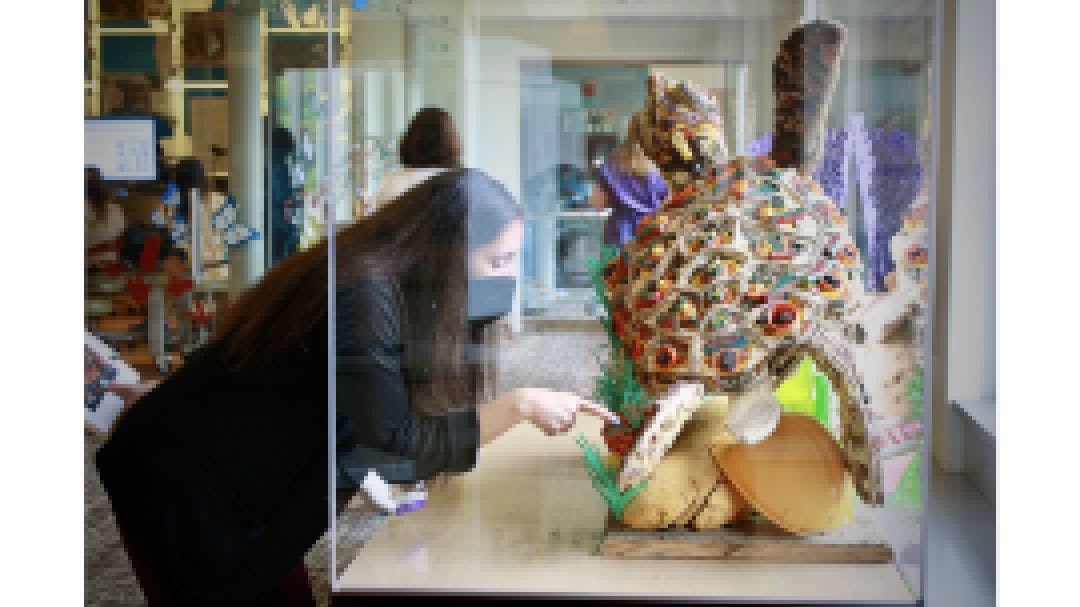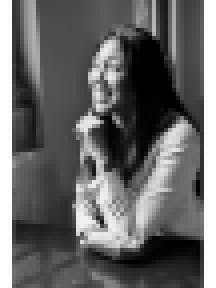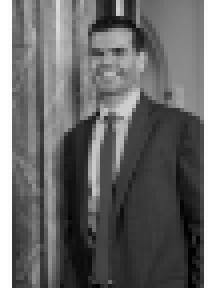

WASHINGTON — Curiosity and creativity were on display when dozens of top teachers from around the U.S. gathered on the National Mall at the end of April.
The educators were state winners of the Teacher of the Year program, hosted annually by the Council of Chief State School Officers. During their visit to the nation’s capital, the teachers toured the White House, visited the U.S. Department of Education and celebrated at a gala in their honor.
EdSurge spent a morning with the teachers as they toured Smithsonian museums in small groups. They learned how to create interdisciplinary lessons that blend art, science and history and how to use Smithsonian collections and resources in their own classrooms back home, thanks to activities designed by educators who work at institutions including the National Museum of Natural History, the National Museum of African American History and Culture, and the American Art Museum.
For one group, the experience included visiting the ocean hall at the National Museum of Natural History, where they viewed exhibits under a giant whale specimen displayed from the ceiling, then reflected on the sensory details they observed and how those might appeal to students. Next, they deconstructed a cellphone as part of a lesson about all of the people and resources around the world required to create the technology that many of us take for granted. Finally, the teachers were given an assignment: Use construction paper to create a craft symbolizing what they hope to take away from their time at the Smithsonian.
These activities required enthusiasm and ingenuity—the same traits that teachers possess in abundance, according to three Teacher of Year finalists who sat down for interviews with EdSurge.
While reflecting on the state of their profession, each member of the trio expressed a variation of the following observation: Teachers are experts who deserve more trust.
Read more insights from Teacher of the Year finalists below.
Autumn Rivera, 2022 Colorado Teacher of the Year
So many times we hear that teachers are superheroes, and I really want to disagree with that, because I’m not a superhero. I’m a human being.

The teaching seed was planted in Autumn Rivera’s psyche when she was quite young. Her mother was a middle school science teacher whose parenting “really incorporated a lot of that curiosity and wonder and awe, kind of like we saw at the Smithsonian here today,” she says.
Rivera grew up to become a middle school science teacher, too. Latino students make up the majority at her school in Glenwood Springs, Colorado, which follows an EL—formerly known as Expeditionary Learning—curriculum.
“I try to teach my students that science isn’t just happening in a textbook, but that is happening all around us,” Rivera explains. “That idea of grounding your learning in something that’s real life and that matters is really important.”
Teaching during the pandemic has been hard, Rivera acknowledges. To combat the isolation created by the health crisis, she focuses on maintaining relationships with her students. One strategy she used to sustain connection and communication was posting short science lessons to TikTok.
“Don’t forget to have fun with your students. So much time we spend pushing through our curriculum or making sure we’re preparing for a test that we can sometimes forget those relationships,” she says. “I think sometimes we just need more laughter in schools.”
Rivera adds that she wants to celebrate the resilience that students have shown over the past two years.
“We have this idea that they’ve lost learning, but I really want to change that narrative into: Their learning has shifted,” she explains. “They learned a lot. It might not have been the science I wanted them to learn, but they learned how to learn online and in person; they learned how to change at a moment’s notice, they learned how to keep themselves and … their family safe. I’m pretty sure they all have graduate degrees in technology at this point.”
Rivera believes that education would improve if leaders at every level listened to teachers more, trusted them as experts and drew on their insight when making decisions.
“I think a lot of times we’re trying to turn teachers into robots, and trying to make every single teacher be the same and teach in the same way, and by doing that we’re limiting the creativity of teachers,” she says, advocating for allowing teachers to do what works best for their own students.
Rivera experienced this several years ago when a group of her students expressed interest in raising money to preserve a local lake that was slated for possible development. By selling T-shirts, baked goods and some of their own artwork, they raised more than $1,000 to donate to a land trust. The organization eventually purchased and conserved the lake, which was recently incorporated into a new Colorado State Park.
“Allowing my students to sort of go where their passion led instead of me directing it, I think, was really awesome and empowering to students in the moment,” she reflects. “It was a huge celebration for all of us.”
For better or worse, the work of a teacher is never done, Rivera believes. She’s always thinking through lesson plans and seating charts, even at the grocery store and in the shower. That creativity and commitment is commendable, Rivera notes, but it also means that sometimes people take educators’ hard work for granted.
“So many times we hear that teachers are superheroes, and I really want to disagree with that, because I’m not a superhero. I’m a human being that sometimes needs to eat food and go to the bathroom when I want to,” she says. “Yes, we’re working hard and we’re here for our students, but we also are human beings, and so setting those boundaries, I think, is also really important.”
Whitney Aragaki, 2022 Hawaii Teacher of the Year
Right now, there are so many voices that are speaking louder than teachers about the state of education that sometimes the teacher voice and the teacher experience is drowned out in the noise.

Whitney Aragaki grew up in a family of teachers and didn’t foresee herself pursuing that career. But a college education course changed her perspective.
“I found that I was able to do the science that I love, that I had passion for, but also connect with students and connect the community into the classroom,” she reflects.
Now she’s a high school biology and environmental science teacher in Hawaii who integrates lessons about public service into the curriculum.
“Much of my work focuses on how to develop strong public servants and environmental stewards in biology,” she says.
The pandemic challenged Aragaki to let go of her expectations for always being able to carefully manage her classroom. She came to appreciate that students learn plenty outside of the school building, and says that “anyone in a child’s life can be a teacher to them.”
“So during the pandemic, instead of me always creating the lessons, I turn it over,” she explains. “Students would interview family members, or walk outside and observe in the natural environment and see what the environment was telling them at that time, then bring the ideas of climate, living systems and living species into our classroom conversations.”
Aragaki believes that teachers are doing their jobs as best they can given the hard circumstances and limited resources available to them. And not only that—they’re constantly innovating and growing their skills as professionals, she says. She challenges anyone who doubts that to reconsider their view.
“We need to trust our teachers,” she urges. “Right now, there are so many voices that are speaking louder than teachers about the state of education that sometimes the teacher voice and the teacher experience is drowned out in the noise.”
Teachers also have some important listening to do, Aragaki says: to their own students.
“Students give the best feedback,” she says. “And if we’re willing to listen, and if they feel heard in the classroom, then they can create really amazing experiences for their own learning. Their intrinsic motivation to learn what they want to learn can really drive a classroom conversation. It can amplify a lab and it can make a field trip so much more meaningful than a one-day experience.”
Even when teaching gets tough, Aragaki hopes that educators will stay proud of their work.
“Keep moving forward and hold your head up high. We are professionals in this practice,” she encourages her peers. “We are entrusted with the gifts of our community and it is a privilege to teach our students in the public sphere.”
Joseph Welch, 2022 Pennsylvania Teacher of the Year
We can all recognize that teachers change lives. Everybody’s story involves a teacher, right? But how do we make sure that we are again trusting teachers to be able to do that work?

From an early age, Joseph Welch was captivated by his grandmother’s stories about her service in the Women’s Army Corps. They taught Welch that history is made up of “little moments” in people’s lives.
“Those small stories, that’s what makes us who we are. That’s what connects us with each other,” Welch says.
He brings that perspective to his work as an eighth grade U.S. history teacher in Pittsburgh. And when the pandemic prompted his school to go remote, he devised an innovative way to keep his students engaged in learning about the moments and movements that have shaped the nation’s past and present: virtual field trips.
Welch and his colleagues traveled around the mid-Atlantic and used a phone, a small router and a computer to broadcast themselves teaching from historic sites. During a memorable lesson filmed in Washington, D.C., one teacher was set up at the Washington Monument, a second was at the Lincoln Memorial and a third was at the World War II Memorial.
The virtual field trips were a hit with students, Welch says. And parents even popped into the video calls to share in the experience.
“I’m big on getting students to actually feel the power of a place,” he says. “That whole packaging, I think, has elements of everything that makes education purposeful: You’re connecting to your community, you’re connecting to each other and you’re connecting with the places that you’re around that define and tell the story.”
The success of Welch’s effort makes the teacher think that education during the health crisis has succeeded in ways that people may not fully appreciate. He recalls how teachers were celebrated at the outset of the pandemic—a narrative that has since “dissipated,” he says. That positive-to-negative attitude shift has made Welch believe “we need to re-professionalize the profession” in the minds of the general public.
“We can all recognize that teachers change lives. Everybody’s story involves a teacher, right?” he says. “But how do we make sure that we are again trusting teachers to be able to do that work?”
When Welch reflects on his own evolution as a teacher, he credits lessons he learned about listening deeply during an improv class he took as a high school theater student.
“Basically, it was just being dropped in the middle of a scene, and you have to listen to what somebody’s telling you and react to it,” he recalls. “That’s so vital as a teacher now, to think back and have that skill, and to really put yourself into listening to what a student is saying to you, being able to process that quickly and to make sure that you acknowledge that.”
In addition to listening, Welch emphasizes the importance of teachers being their real selves with their students and building what he calls “authentic relationships.”
“When you walk into that school building, you realize that, ‘I don’t know what’s going to happen today, but something impactful is going to happen,’” he says. “The rewards of the career are in those relationships.”